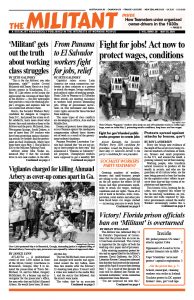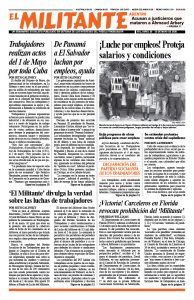The Militant was informed May 12 by Florida’s Department of Corrections that the prison ban on issue no. 13 had been overturned. This victory is important for the rights of both the working-class paper and of prisoners.
After receiving numerous protest letters and an appeal filed by the Militant’s attorney, David Goldstein, the DOC’s Literature Review Committee informed him that they had reversed the impoundment of the April 6 issue at their meeting May 7. “As a result of that decision the issue will be allowed into Florida correctional institutions,” wrote committee administrator Dean Peterson.
“I’m not surprised we won this,” said Militant editor John Studer. “Barring the paper because it showed pictures of nurses, shipyard workers and meatpacking workers raising a fist as part of their struggles was particularly egregious.
“Workers behind bars have the same rights as those outside prison walls, to read about the world, consider different views and form their own opinions without interference by prison authorities.
“We’ll fight every time prison officials anywhere try to ban us,” he said.
The paper has had to fight Florida prison efforts to suppress the Militant for the last few years and has won the lion’s share. With this victory the Militant’s 53 subscribers in 24 prisons in Florida, and many others who read it as the paper makes its way around the prisons, will now have access to this issue.
Prison authorities at the Jefferson Correctional Institution in Monticello, Florida, attempted to justify the ban by claiming the photos of raised fists by workers in struggle were just “gang signs.”
Many letters from prominent civil liberties organizations and by individual workers and others alike were sent to the Literature Review Committee and they helped win the decision to overturn the ban.
They included protests from Amnesty International USA, National Lawyers Guild, American Civil Liberties Union of Florida, Reporters Committee for Freedom of the Press, union officials and many others.
“I recently became aware the Militant newspaper is, again, being suppressed in a Florida state prison,” wrote Vonie Long, president of United Steelworkers Local 1165 in Coatesville, Pennsylvania.
“The raised fist is a long recognized symbol of solidarity in the labor movement and is not a gang sign,” he said. “The steelworkers union, the labor movement and our partnerships strive every day for unity and solidarity in the working class and our communities and I ask the Jefferson Correctional Institution to end the suppression.”
Long attached a photo of himself holding a steelworkers placard, raising his fist.
“The justification offered for the ban is unsupported by the contents of the impounded issue,” wrote Samuel Morley, general counsel for the Florida Press Association, which represents all the daily and most of the weekly newspapers in Florida. The impoundment “infringes upon the First Amendment rights of both the Militant’s publisher and its incarcerated subscribers.”
In his appeal Goldstein pointed out that attempting to ban the Militant based on its pictures of workers’ struggles was unconstitutional. “The raised fist has a long and proud political history,” wrote Goldstein, “from at least as early as 1848 worker protests, early 20th century worker protests, and anti-fascist protests in the 1930s, to modern political protest movements, especially in the civil rights movement that overthrew Jim Crow segregation. For over a century, the raised fist has been a symbol of worker solidarity, just as it is commonly used by workers today.”
“Too many times prison authorities have arbitrarily and unjustly trampled upon rights of the incarcerated,” wrote retail workers Joye Beaman and Salm Kolis from Chicago. “The Bill of Rights is not void within prison walls.”
To contribute to the Militant Prisoners’ Fund, which makes it possible for the paper to send workers behind bars reduced price subscriptions, send a check payable to the Militant to 306 W. 37th St., 13th Floor, New York, NY 10018, or donate at themilitant.com.

